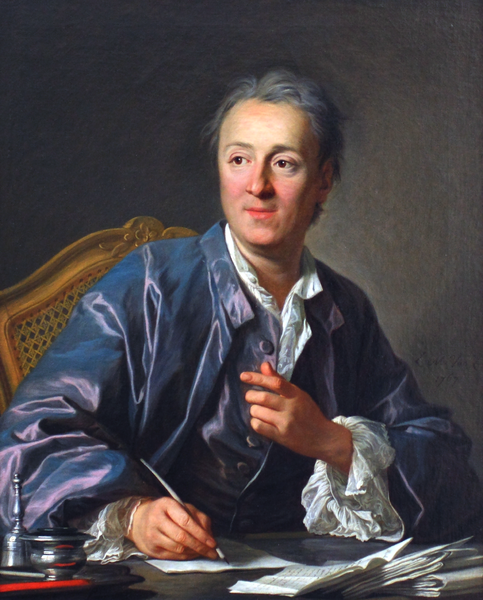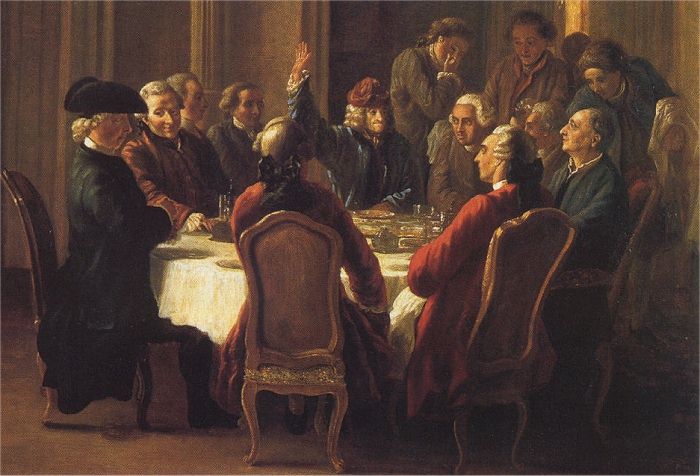"A thing is not proved just no one has ever questioned it.
What has never been gone into impartially has never been properly gone into.
Hence scepticism is the first step toward truth .
It must be applied generally, because it is the touchstone."
Diderot
Diderot
Grande figure de la philosophie des Lumières et créateur de l’Encyclopédie,
Denis Diderot, né à Langres (Haute-Marne)
le 5 octobre 1713, mort à Paris le 31 juillet 1784.

Diderot by Louis-Michel van Loo, 1767
*
Before there was Wikipedia, there were encyclopedias —
October 5th marked the 300th birthday of the father of one of the world's most important.
18th century French philosopher Denis Diderot
was the driving force behind the Encyclopédie,
one of the first compendiums of human knowledge of its time.

*
The anniversary of his birth has prompted calls for Diderot to receive France's highest honor:
have his remains reinterred in Paris' Pantheon,
a mausoleum of sorts for France's national heroes.
*
*
'The Major Intellectual Adventure Of The 18th Century'
Diderot was one of the major figures of the French Enlightenment,
a time when thinkers like Voltaire and Jean-Jacques Rousseau
expounded on the freedoms of religion and expression,
as well as the power of reason over blind faith.
As a philosopher, though, Diderot has kind of been lost to history.
Walk down into the crypts below the Pantheon and you will find huge,
glorious tombs to Voltaire and Rousseau — but no Diderot.
At 300, Encyclopedia Pioneer May Yet Get A Hero's Burial.....
 | |||||||||
| 'Une diner des philosophes' | |||||||||
| by Jean Huber Voltaire | |||||||||
| Denis Diderot is the third from the right | |||||||||
*
“Our observation of nature must be diligent,
our reflection profound, and our experiments exact.
We rarely see these three means combined and for this reason,
creative geniuses are not common."

Portrait of Denis Diderot, by Fragonard.
*
“Fanaticism is just one step away from barbarism."
*
*
“Fanaticism is just one step away from barbarism."
*
A block or so away at the Sorbonne Library, Philippe Marcerou flips
through an original,
leather-bound edition of Diderot's crowning achievement.
The 28-volume Encyclopédie was first published in 1751
and took Diderot more than 20 years to complete,
with the help of more than a hundred other writers.
"The Encyclopédie is the major intellectual adventure of the 18th century,"
says Marcerou, the library's director.
The collection's big innovation was Diderot's system of cross-references that link disparate
but related articles together — what Marcerou calls a kind of search algorithm for the 1700s.
"Today everybody knows Google," Marcerou says.
"The major invention of the Encyclopédie is the same system:
The cross-reference is a way of making a kind of web out of the knowledge."
Caroline Warman, a French scholar at the University of Oxford,
says even the simplest of entries can lead readers on a wild journey.
Take the definition for apricot:
It's just a run-of-the-mill, botanical entry, but at the end there's this little asterisk.
"The asterisk introduces a recipe written by Diderot himself about how to make apricot jam,"
Warman says.
Diderot recommends using green apricots and filling a basin half full with water,
but the sugar is where things get really interesting.
And if you're Marcerou, that might prompt you to look up liberty,
which he says is one of the Encyclopédie's most important entries.
"The definition is:
'Liberty consists in the power of an intelligent being (to do)
what he wants according to his own determination,' "
Marcerou says, reading from the Encyclopédie.
"This particular definition, in the middle of the 18th century,
is something absolutely incredible."
Ultimately, he says,
Diderot challenged the authority of the French monarchy and the Catholic Church.

*
*
...Some scholars say the ideas circulated in the Encyclopédie helped lay the foundation
for the French Revolution, and even the American Revolution that came before it.
Andrew Curran, an expert on Diderot at Wesleyan University,
explains that with over 20,000 copies in print,
Diderot's encyclopedias were among the most widely distributed
and influential books of the era.
"Commercially, the encyclopedia did extremely well," he says.
"Diderot himself made very little money off the whole project,
but the publishers became extremely rich."....
read all here

Statue of Denis Diderot
in the city of Langres, his birthplace
*
“There are three principal means of acquiring knowledge. . .
observation of nature, reflection, and experimentation.
Observation collects facts,
reflection combines them,
experimentation verifies the result of that combination."
Denis Diderot

*
leather-bound edition of Diderot's crowning achievement.
The 28-volume Encyclopédie was first published in 1751
and took Diderot more than 20 years to complete,
with the help of more than a hundred other writers.
"The Encyclopédie is the major intellectual adventure of the 18th century,"
says Marcerou, the library's director.
The collection's big innovation was Diderot's system of cross-references that link disparate
but related articles together — what Marcerou calls a kind of search algorithm for the 1700s.
"Today everybody knows Google," Marcerou says.
"The major invention of the Encyclopédie is the same system:
The cross-reference is a way of making a kind of web out of the knowledge."
Caroline Warman, a French scholar at the University of Oxford,
says even the simplest of entries can lead readers on a wild journey.
Take the definition for apricot:
It's just a run-of-the-mill, botanical entry, but at the end there's this little asterisk.
"The asterisk introduces a recipe written by Diderot himself about how to make apricot jam,"
Warman says.
Diderot recommends using green apricots and filling a basin half full with water,
but the sugar is where things get really interesting.
And if you're Marcerou, that might prompt you to look up liberty,
which he says is one of the Encyclopédie's most important entries.
"The definition is:
'Liberty consists in the power of an intelligent being (to do)
what he wants according to his own determination,' "
Marcerou says, reading from the Encyclopédie.
"This particular definition, in the middle of the 18th century,
is something absolutely incredible."
Ultimately, he says,
Diderot challenged the authority of the French monarchy and the Catholic Church.

“Only passions, great passions,
can elevate the soul to great things."
can elevate the soul to great things."
*
*
...Some scholars say the ideas circulated in the Encyclopédie helped lay the foundation
for the French Revolution, and even the American Revolution that came before it.
Andrew Curran, an expert on Diderot at Wesleyan University,
explains that with over 20,000 copies in print,
Diderot's encyclopedias were among the most widely distributed
and influential books of the era.
"Commercially, the encyclopedia did extremely well," he says.
"Diderot himself made very little money off the whole project,
but the publishers became extremely rich."....
read all here

Statue of Denis Diderot
in the city of Langres, his birthplace
*
“There are three principal means of acquiring knowledge. . .
observation of nature, reflection, and experimentation.
Observation collects facts,
reflection combines them,
experimentation verifies the result of that combination."
Denis Diderot

*
| links: http://en.wikipedia.org/wiki/Denis_Diderot http://www.npr.org/2013/10/05/228892676/at-300-encyclopedia-pioneer-may-yet-get-a-heros-burial |

Des publications tellement éducatives, tu m'as ramenée à l'époque de mes études universitaires quand on faisait Diderot en Lettres. Ce n'était pas mon préféré, mais sa figure a certainement marqué le cours de l'histoire de l'homme. Pourtant je remarque-peut-être que je me trompe-que la Sorbonne par exemple s'oriente désormais vers la littérature contemporaine et les philosophes actuels plutôt qu' à ses choix traditionnels et conservateurs. Je trouve cela dommage pour les nouveaux étudiants....
ReplyDeleteBien apprécié Verdi , je l'adore!
Bonne soirée Karin!
Non que je suis pour le conservatisme, tout au contraire mais je le dis parce que on a souvent "accuse" cet établissement de conservatisme, d'où le tournant... C'est difficile de s'exprimer parfois...
ReplyDeletewonderful post Karin ! I remember my first encyclopedia ... my mam and dad gave it to me on my 11th birthday ... I treasured it for years and in fact still have it ... I love the fact that you can get all sorts of information on the internet but I will never lose my love of books ! happy autumn weekend ... Gail x
ReplyDelete